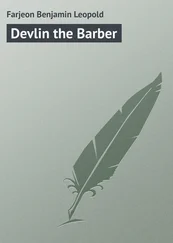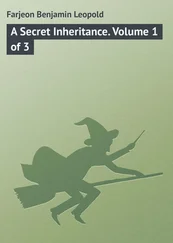Benjamin Farjeon - The Nine of Hearts
Здесь есть возможность читать онлайн «Benjamin Farjeon - The Nine of Hearts» — ознакомительный отрывок электронной книги совершенно бесплатно, а после прочтения отрывка купить полную версию. В некоторых случаях можно слушать аудио, скачать через торрент в формате fb2 и присутствует краткое содержание. Жанр: foreign_prose, на английском языке. Описание произведения, (предисловие) а так же отзывы посетителей доступны на портале библиотеки ЛибКат.
- Название:The Nine of Hearts
- Автор:
- Жанр:
- Год:неизвестен
- ISBN:нет данных
- Рейтинг книги:3 / 5. Голосов: 1
-
Избранное:Добавить в избранное
- Отзывы:
-
Ваша оценка:
- 60
- 1
- 2
- 3
- 4
- 5
The Nine of Hearts: краткое содержание, описание и аннотация
Предлагаем к чтению аннотацию, описание, краткое содержание или предисловие (зависит от того, что написал сам автор книги «The Nine of Hearts»). Если вы не нашли необходимую информацию о книге — напишите в комментариях, мы постараемся отыскать её.
The Nine of Hearts — читать онлайн ознакомительный отрывок
Ниже представлен текст книги, разбитый по страницам. Система сохранения места последней прочитанной страницы, позволяет с удобством читать онлайн бесплатно книгу «The Nine of Hearts», без необходимости каждый раз заново искать на чём Вы остановились. Поставьте закладку, и сможете в любой момент перейти на страницу, на которой закончили чтение.
Интервал:
Закладка:
Witness. "Oh yes."
The Attorney-general. "Is this it?" (Ulster produced.)
Witness. "Yes, that is it."
The Attorney-general. "You swear to it?"
Witness. "I do."
The Attorney-general. "You have said that the prisoner came out of his house wearing this ulster. Now, on the occasions you have described, when the prisoner left his carriage and returned to it, was this ulster ever off his back?"
Witness. "He wore it all the time."
The Attorney-general. "You are positive he did not at any time leave you with this ulster on, and return wearing another?"
Witness. "I am positive of it."
The Attorney-general. "After the lady got into the carriage, and the prisoner told you there was no occasion for you to mention what you had seen, or that he had spoken to you about the lady, what did he do?"
Witness. "He told me to drive to Prevost's Restaurant, in Church Street, Soho, and then he got into the carriage."
The Attorney-general. "At any time during the night did you see the lady's face?"
Witness. "Not at any time."
The Attorney-general. "Were you familiar with Prevost's Restaurant?"
Witness. "No, I had never been there, and I was in doubt where Church Street was. I had to inquire my way."
The Attorney-general. "Could not the prisoner tell you?"
Witness. "I asked him, and he said he could not direct me."
The Attorney-general. "However, you found the restaurant?"
Witness. "Yes."
The Attorney-general. "And then?"
Witness. "My master and the lady entered the restaurant."
The Attorney-general. "What did your master say to you?"
Witness. "He told me to wait near the door."
The Attorney-general. "Did you know what time it was when you drew up at the restaurant?"
Witness. "It was ten minutes to eleven."
The Attorney-general. "How long were you kept waiting?"
Witness. "Exactly an hour and five minutes."
The Attorney-general. "That will bring it to five minutes to twelve?"
Witness. "Yes, sir."
The Attorney-general. "Did the prisoner then come from the restaurant?"
Witness. "Yes, accompanied by the lady."
The Attorney-general. "It was still raining?"
Witness. "Raining hard now."
The Attorney-general. "Did he appear flurried? Was he excited?"
Witness. "His movements were very hurried, which I thought was due to the rain, and perhaps to his having had a little too much wine. He opened the door of the carriage quickly, and the lady jumped in, to avoid the rain, I suppose. My master got in quickly after her."
The Attorney-general. "But he gave you instructions?"
Witness. "All he said was, 'Home!'"
The Attorney-general. "Calmly?"
Witness. "No, sir. Although he only said one word, I noticed that his voice was thick. It was because of that I suspected he had taken a little too much wine."
The Attorney-general. "Did you observe that he had his ulster on?"
Witness. "Yes, he had it on."
The Attorney-general. "You drove home-and then?"
Witness. "My master got out, helped the lady out-no, I am making a mistake."
The Attorney-general. "Commence again."
Witness. "My master got out, opened the street door with his latch-key, then returned to the carriage and helped the lady out, and they both passed into the house."
The Attorney-general. "Were his actions steady?"
Witness. "They were not, sir. He seemed to be in a strange hurry."
The Attorney-general. "Did he say nothing to you?"
Witness. "Nothing. And thinking my day's work was over, I took the horses to the stable. I was glad enough."
The Attorney-general. "The prisoner was in the habit of carrying a latch-key?"
Witness. "Yes, and always let himself into the house."
The Attorney-general. "Did you observe whether the gas in the hall was lighted?"
Witness. "It was. It was always kept on when my master was out. His habit was to turn it off himself, the servants sometimes being abed."
The Attorney-general. "Now, during the time you were in the prisoner's employment, had you ever passed such a day as this you have described?"
Witness. "Never."
The Attorney-general. "Did you ever know him to come home with a lady, alone, at that hour of the night?"
Witness. "Never."
The Attorney-general. "All the incidents of the day were unusual?"
Witness. "Very unusual. I thought them very strange."
The Attorney-general. "The question I am about to put is, in another form, partly a repetition of one you have already answered. Did you ever know the prisoner to come home in the carriage late at night with a strange lady-that is, with any other lady than his wife?"
Witness. "Never. With a gentleman sometimes, and sometimes with more than one gentleman; but never with a strange lady."
The Attorney-general. "He occasionally came home late with friends?"
Witness. "Oh yes; but then his wife was always with him."
The Attorney-general. "During the last few months was this usual?"
Witness. "No. Mrs. Layton was an invalid, and seldom drove out-not once during the last three or four months at night."
The Attorney-general. "On the day we have gone through-the 25th of March did you see anything of Mrs. Layton?"
Witness. "No, sir, she was seriously ill."
The Attorney-general. "That, however, is not within your personal observation?"
Witness. "No, sir. My duties were outside the house."
The Attorney-general. "The lady whom he brought home on the night of the 25th of March was not his wife?"
Witness. "No, sir. Mrs. Layton had been confined to her room for several weeks."
The Attorney-general. "You are quite positive on this point?"
Witness. "Quite positive, sir."
The Attorney-general. "That will do."
(To the surprise of every person in court, who expected that the witness would be subjected to a long cross-examination, the prisoner asked but few questions.)
Prisoner. "You say that at five minutes to twelve I came out of Prevost's Restaurant?"
Witness. "You and the lady, sir."
Prisoner. "It was a dark night?"
Witness. "It was, sir."
Prisoner. "Did I call for you?"
Witness. "No, sir. I saw you come out of the restaurant with the lady, and I drew up at once. I was within half a dozen yards of the door."
Prisoner. "When the lady and I got into the carriage, as you say, and I called out, Home!' you observed that my voice was thick and my manner flurried?"
Witness. "Yes, sir."
Prisoner. "Did it occur to you then, or does it occur to you now, that the voice which uttered that word was not my voice?"
Witness. "No, sir."
Prisoner. "You are certain it was my voice?"
Witness. "Yes, sir."
Prisoner. "I wore my ulster?"
Witness. "Yes, sir."
Prisoner. "You drove home, and you saw me open the street door with a latch-key and pass into the house with the lady?"
Witness. "Yes, sir."
Prisoner. "Still with my ulster on?"
Witness. "Yes, sir."
Prisoner. "Did I turn my face towards you?"
Witness. "No, sir."
Prisoner. "If I had done so, could you have recognized my features in the darkness?"
Witness. "Scarcely, sir."
Prisoner. "You know nothing more?"
Witness. "Nothing more, sir."
Prisoner. "I do not put the question offensively-you have been a good servant, and I have never had occasion to find fault with you-but you are positive that the version you have given of my later movements is correct?"
Witness (who appeared much distressed). "I am positive, sir."
Prisoner. "I have nothing more to ask, Moorhouse."
Witness. "Thank you, sir."
Re-examined. "You are a strict teetotaler?"
Witness. "Yes, sir."
The Attorney-general. "Did you take any ale or spirits during the day?"
Witness. "No, sir. I have touched neither for years."
Читать дальшеИнтервал:
Закладка:
Похожие книги на «The Nine of Hearts»
Представляем Вашему вниманию похожие книги на «The Nine of Hearts» списком для выбора. Мы отобрали схожую по названию и смыслу литературу в надежде предоставить читателям больше вариантов отыскать новые, интересные, ещё непрочитанные произведения.
Обсуждение, отзывы о книге «The Nine of Hearts» и просто собственные мнения читателей. Оставьте ваши комментарии, напишите, что Вы думаете о произведении, его смысле или главных героях. Укажите что конкретно понравилось, а что нет, и почему Вы так считаете.












